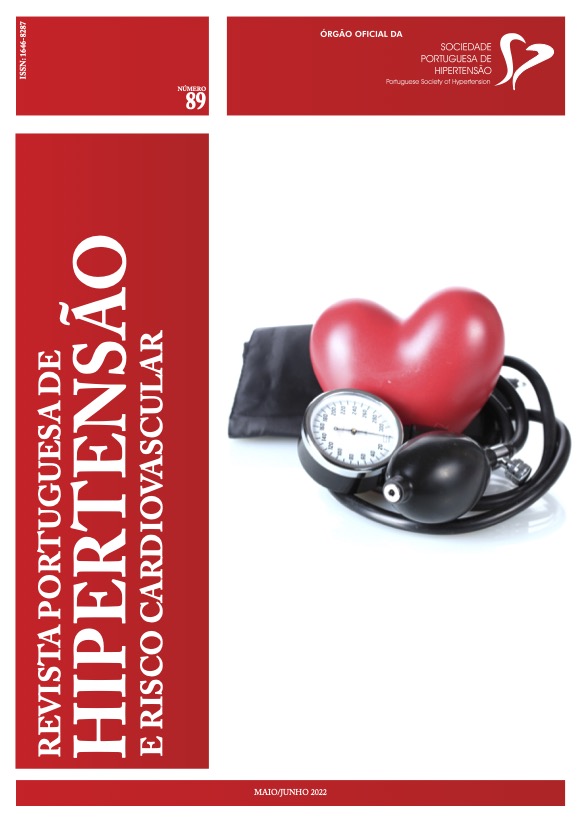CHRONOTHERAPY IN CHRONIC KIDNEY DISEASE PATIENTS WITH HYPERTENSION: AN EVIDENCE-BASED MEDICINE REVIEW
DOI:
https://doi.org/10.58043/rphrc.49Keywords:
Chronotherapy, Chronic Kidney Disease, Antihypertensive Drugs, Cardiovascular MorbimortalityAbstract
OBJECTIVE: This review’s goal is to evaluate, based on the best available evidence, the differences in blood pressure control, blood pressure profile and cardiovascular risk between administering antihypertensive drugs at bedtime (chronotherapy) compared to administering antihypertensives drugs at any other time, in a population of hypertensive chronic kidney disease patients not on renal replacement therapy and ascertain if that evidence is represented in the current guidelines.
DATA SOURCES: The Cochrane Library, MEDLINE/PubMed, Direção Geral da Saúde, Sociedade Portuguesa de Nefrologia, Sociedade Portuguesa de Cardiologia, Sociedade Portuguesa de Hipertensão, National Institute for Health and Clinical Excellence, European Society of Hypertension-European Society of Cardiology, National Guideline Clearinghouse, Canadian Medical Association, American Journal of Kidney Diseases e Kidney Disease: Improving Global Outcomes.
METHODS: Search of meta-analysis (MA), systematic reviews (SR), clinical trials and guidelines available in English, Portuguese and Spanish using the MeSH terms “Antihypertensive Agents”, “Drug Administration Schedule” and “Kidney Diseases” without limiting the time of the publication. The American Family Physician’s Strength of Recommendation Taxonomy (SORT) was used to assess the levels of evidence and the strength of recommendation. Articles that did not meet the purposes of this evidence-based review were excluded.
RESULTS: A total of 52 scientific articles were found in the initial research, six of which met the inclusion criteria (one MA, one RS and four ECR). The guidelines search resulted in six clinical guidelines that were included in this review. The results show that, although the bedtime administration of anti-hypertensive drugs showed a similar daytime and 24-hour blood pressure reduction as the morning administration of these drugs, chronotherapy transforms nighttime blood pressure profiles from non-dipper/riser to dipper and significantly reduces the nighttime blood pressure and cardiovascular risk. The guidelines have no recommendation regarding the optimal schedule of administration of anti-hypertensive drugs. Two of them reference chronotherapy, raising the question of whether it translates into improvement of outcomes in chronic kidney disease patients or in long term cardiovascular benefits.
CONCLUSION: The administration of antihypertensive drugs at bedtime may be encouraged in hypertensive patients with chronic kidney disease to decrease nighttime blood pressure and therefore reduce cardiovascular risk (strength of recommendation B), a fact that may suggest an update of the current guidelines.
Downloads
References
Gansevoort RT, Correa-Rotter R, Hemmelgarn BR, Jafar TH, Heerspink HJL, Mann JF, et al. Chronic kidney disease and cardiovascular risk: epidemiology, mechanisms, and prevention. Lancet. 2013;382(9889):339–52.
Direção-Geral da Saúde. Hipertensão Arterial: definição e classificação. Norma da Direção-Geral da Saúde n.o 020/2011 28/09/2011 (atualizado a 19/03/2013). 2012;1– 6. Available from: https://www.dgs.pt/directrizes-da-dgs/normas-e-circulares-normativas/norma-n-0202011-de- 28092011-atualizada-a-19032013-jpg.aspx
National Kidney Foundation. K/DOQI clinical practice guidelines for chronic kidney disease: evaluation, classification, and stratification. Am J Kidney Dis. 2002;39(2 Suppl 1):S1-266.
Okutucu S, Karakulak UN, Kabakçı G. Circadian blood pressure pattern and cardiac autonomic functions: different aspects of same pathophysiology. Anadolu Kardiyol Derg. 2011;11(2):168–73.
Hermida RC, Smolensky MH, Ayala DE, Fernández JR, Moyá A, Crespo JJ, et al. Abnormalities in chronic kidney disease of ambulatory blood pressure 24 h patterning and normalization by bedtime hypertension chronotherapy. Nephrol Dial Transplant. 2014;29(6):1160–7.
Mojón A, Ayala DE, Piñeiro L, Otero A, Crespo JJ, Moyá A, et al. Comparison of ambulatory blood pressure parameters of hypertensive patients with and without chronic kidney disease. Chronobiol Int. 2013;30(1–2):145–58.
PogueV,RahmanM,LipkowitzM,TotoR,MillerE, Faulkner M, et al. Disparate estimates of hypertension control from ambulatory and clinic blood pressure measurements in hypertensive kidney disease. Hypertension. 2009;53(1):20–7.
Judd E, Calhoun DA. Management of hypertension in CKD: beyond the guidelines. Adv Chronic Kidney Dis. 2015;22(2):116–22.
P. Barata, C. Lopes, D. Santos, R. Oliveira, I. Múrias, F. Veigas. Cronoterapia: estratégia futura para a libertação de fármacos. Acta Farmacêutica Portuguesa. 2011;1.
Ohdo S. Chronotherapeutic strategy: Rhythm monitoring, manipulation and disruption. Adv Drug Deliv Rev. 2010;62(9–10):859–75.
Ebell MH, Siwek J, Weiss BD, Woolf SH, Susman J, Ewigman B, et al. Strength of recommendation taxonomy (SORT): a patient-centered approach to grading evidence in the medical literature. Am Fam Physician. 2004;69(3):548–56.
Wang C, Qiu X, Lv L, Huang J, Li S, Lou T, et al. Chronotherapy for hypertension in patients with chronic kidney disease: a systematic review and meta-analysis in non- black patients. Int Urol Nephrol. 2017;49(4):651–9.
Liu X, Liu X, Huang W, Leo S, Li Y, Liu M, et al. Evening -versus morning- dosing drug therapy for chronic kidney disease patients with hypertension: a systematic review. Kidney Blood Press Res. 2014;39(5):427–40.
Hermida RC, Ayala DE, Mojón A, Fernández JR. Bedtime dosing of antihypertensive medications reduces cardiovascular risk in CKD. J Am Soc Nephrol. 2011;22(12):2313–21.
Crespo JJ, Piñeiro L, Otero A, Castiñeira C, Ríos MT, Regueiro A, et al. Administration-time-dependent effects of hypertension treatment on ambulatory blood pressure in patients with chronic kidney disease. Chronobiol Int. 2013;30(1–2):159–75.
Wang C, Zhang J, Liu X, Li C-C, Ye ZC, Peng H, et al. Effect of valsartan with bedtime dosing on chronic kidney disease patients with nondipping blood pressure pattern: Valsartan at bedtime for chronic kidney disease. J Clin Hypertens (Greenwich). 2013;15(1):48–54.
Rahman M, Greene T, Phillips RA, Agodoa LY, Bakris GL, Charleston J, et al. A trial of 2 strategies to reduce nocturnal blood pressure in blacks with chronic kidney disease. Hypertension. 2013;61(1):82–8.
Kidney Disease: Improving Global Outcome (KDIGO) Blood Pressure Work Group. KDIGO Clinical Practice Guideline for the Management of Blood Pressure in Chronic Kidney Disease. Kidney Int Suppls. 2012; 2:337-414.
National Institute for Health and Care Excellence. Chronic kidney disease in adults: assessment and management [Internet]. [London]: NICE; 2014 (updated 2015 Jan; cited 2020 Sep 22). (Clinical guideline [CG182]). Available from: https://www.nice.org.uk/guidance/cg182
Williams B, Mancia G, Spiering W, Agabiti Rosei E, Azizi M, Burnier M, et al. 2018 ESC/ESH Guidelines for the management of arterial hypertension. Eur Heart J. 2018;39(33):3021–104.
Ku E, Lee BJ, Wei J, Weir MR. Hypertension in CKD: Core curriculum 2019. Am J Kidney Dis. 2019;74(1):120–31. 22. Nerenberg KA, Zarnke KB, Leung AA, Dasgupta K, Butalia S, McBrien K, et al. Hypertension Canada’s 2018 guidelines for diagnosis, risk assessment, prevention, and treatment of hypertension in adults and children. Can J Cardiol. 2018;34(5):506–25.
Direção-Geral da Saúde. Abordagem Terapêutica da Hipertensão Arterial. Norma da Direção-Geral da Saúde n.o 026/2011 29/09/2011, atualizada a 19/03/2013. Lisboa: DGS; 2011. Available from: https://www.dgs.pt/directrizes-da-dgs/ normas-e-circulares-normativas/norma-n-0262011- de- 29092011-atualizada-a-19032013.aspx
Ku E, Lee BJ, Wei J, Weir MR. Hypertension in CKD: Core curriculum 2019. Am J Kidney Dis. 2019;74(1):120–31. 25. Smolensky MH, Hermida RC, Ayala DE, Tiseo R, Portaluppi F. Administration-time-dependent effects of blood pressure-lowering medications: basis for the chronotherapy of hypertension. Blood Press Monit. 2010;15(4):173–80.
Collins R, Peto R, MacMahon S, Hebert P, Fiebach NH, Eberlein KA, et al. Blood pressure, stroke, and coronary heart disease. Part 2, Short-term reductions in blood pressure: overview of randomised drug trials in their epidemiological context. Lancet. 1990;335(8693):827–38.
Hermida RC, Ayala DE, Smolensky MH, Portaluppi F. Chronotherapy in hypertensive patients: administration- time dependent effects of treatment on blood pressure regulation. Expert Rev Cardiovasc Ther. 2007;5(3):463–75.
Fagard RH, Thijs L, Staessen JA, Clement DL, De Buyzere ML, De Bacquer DA. Night-day blood pressure ratio and dipping pattern as predictors of death and cardiovascular events in hypertension. J Hum Hypertens. 2009;23(10):645– 53.
American Diabetes Association. Standards of medical care in diabetes--2012. Diabetes Care. 2012;35 Suppl 1(Supplement_1):S11-63.
Downloads
Published
How to Cite
Issue
Section
License
Copyright (c) 2022 Revista Portuguesa de Hipertensão e Risco Cardiovascular

This work is licensed under a Creative Commons Attribution 4.0 International License.




